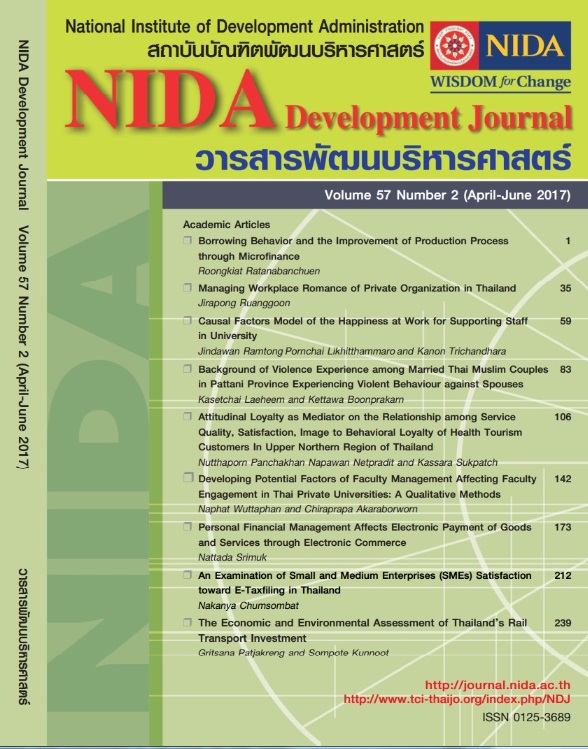การจัดการความรักความใคร่ในที่ทำงานขององค์การธุรกิจในประเทศไทย (Managing Workplace Romance of Private Organization in Thailand)
Keywords:
ความรักความใคร่ในที่ทำงาน, การจัดการ, องค์การธุรกิจ, Workplace romance, Management Private organizationAbstract
การวิจัยมีวัตถุประสงค์เพื่อค้นหาวิธีการจัดการความรักความใคร่ในที่ทำงาน และนำเสนอตัวแบบการจัดการความรักความใคร่ในที่ทำงานเพิ่มพูนผลการปฏิบัติงานขององค์การธุรกิจไทย ผู้วิจัยได้ทำการวิจัยแบบผสานวิธีการ รวบรวมข้อมูลเชิงปริมาณด้วยแบบสอบถามโดยการแจกทางไปรษณีย์ จากผู้ตอบคือผู้จัดการฝ่ายทรัพยากรมนุษย์ของบริษัทที่จดทะเบียนในตลาดหลักทรัพย์แห่งประเทศไทย จำนวน 221 แห่ง รวบรวมข้อมูลเชิงคุณภาพด้วยการสัมภาษณ์เชิงลึกผู้บริหารด้านทรัพยากรมนุษย์ของบริษัทที่มีประสบการณ์ในการจัดการความรักความใคร่ในที่ทำงาน 15 คน และพนักงานผู้ที่มีประสบการณ์ความรักความใคร่ในที่ทำงานอีก 9 คน ประกอบกับการวิเคราะห์เอกสารเพิ่มเติม ผลการวิจัยพบว่า องค์การธุรกิจไทยมีการจัดการความรักความใคร่ในที่ทำงานไปตามแต่ละกรณี มีการกำหนดนโยบายที่เกี่ยวข้องกับความรักความใคร่ในที่ทำงานเพื่อป้องกันความเสี่ยงหรือผลกระทบเชิงลบ มีการเสริมสร้างบรรยากาศที่เอื้อต่อการสร้างความสัมพันธ์ที่ดีของพนักงาน รวมทั้งฝึกอบรมให้ความรู้และเสริมสร้างทัศนคติเกี่ยวกับความรักความใคร่ในที่ทำงานที่เหมาะสม ผลการวิจัยสะท้อนให้เห็นตัวแบบการจัดการความรักความใคร่ในที่ทำงานที่มี 2 รูปแบบ คือ 1) การจัดการที่มุ่งเน้นการควบคุม เพื่อป้องกันและลดความเสี่ยงที่อาจเกิดขึ้น 2) การจัดการที่มุ่งเน้นความผูกพัน ใช้ประโยชน์ที่เกิดขึ้นจากความรักความใคร่ในที่ทำงาน องค์การจะนำรูปแบบการจัดการใดไปปฏิบัตินั้นขึ้นอยู่กับประสบการณ์และวัฒนธรรมขององค์การเป็นสำคัญ
Abstract
The research aims to find the workplace romance management practice and propose the model of the managing workplace romance enhancing the performance of the business organization in Thailand. Mixed method research was used. Quantitative data collected by questionnaires distributed by mail. The respondent is 221 human resources managers of a company listed on The Stock Exchange of Thailand. Gathered qualitative information by interviewing 15 human resource executives of companies with experience in managing workplace and 9 employees who have experienced the love affair at work, with additional document analysis. The results showed that business organization in Thailand has managed workplace romance case by case. They have a policy related to workplace romance to prevent risks or negative consequences of workplace romance. Some organization has fostered an atmosphere conducive to building good relations among employees, including training to enhance their knowledge and attitudes about workplace romance. The findings reflect workplace romance management with two styles that depend on the past experience and organizational culture: 1) control-oriented that prevent and reduce the risks that may occur from workplace romance, 2) involvement-oriented that take advantage of the love affair that happened at work.





